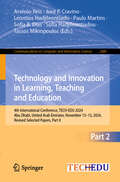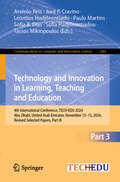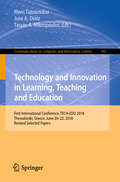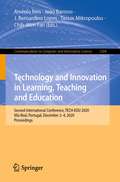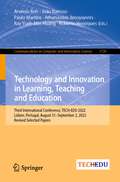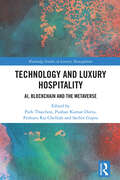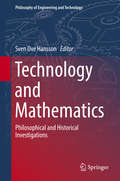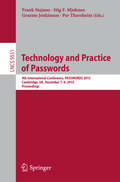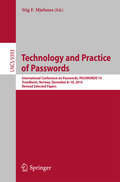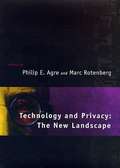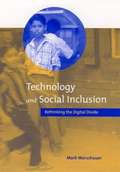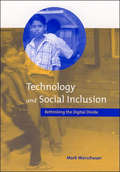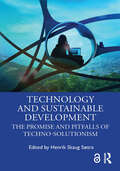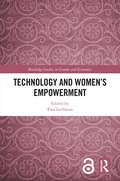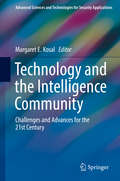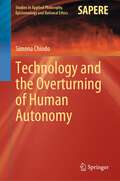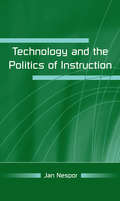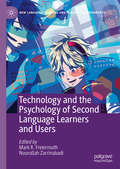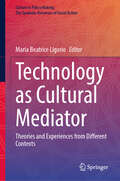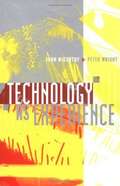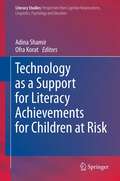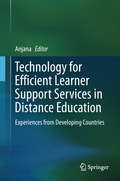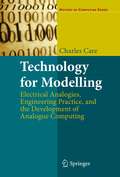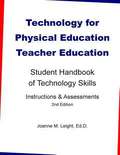- Table View
- List View
Technology and Innovation in Learning, Teaching and Education: 4th International Conference, TECH-EDU 2024, Abu Dhabi, United Arab Emirates, November 13–15, 2024, Revised Selected Papers, Part II (Communications in Computer and Information Science #2480)
by Sofia B. Dias Paulo Martins Arsénio Reis Tassos Mikropoulos José P. Cravino Leontios Hadjileontiadis Sofia HadjileontiadouThe three-volume set CCIS 2479-2481 constitutes the proceedings of the 4th International Conference on Technology and Innovation in Learning, Teaching and Education, TECH-EDU 2024, held in Abu Dhabi, United Arab Emirates, during November 13–15, 2024. The 79 full papers presented in this volume were carefully reviewed and selected from 167 submissions. The papers are organized in the following topical sections: Part I: Artificial Intelligence in Education; Emerging Technologies and Learning Environments. Part II: Open Education, Digital Resources and Online Assessment; Pedagogical and Curricular Innovation. Part III: <span lang="EN-US" style="font-size: 12.0pt; font-family: 'Calibri',sans-serif; mso-fareast-font-family: Calibri; mso-fareast-them
Technology and Innovation in Learning, Teaching and Education: 4th International Conference, TECH-EDU 2024, Abu Dhabi, United Arab Emirates, November 13–15, 2024, Revised Selected Papers, Part III (Communications in Computer and Information Science #2481)
by Sofia B. Dias Paulo Martins Arsénio Reis Tassos Mikropoulos José P. Cravino Leontios Hadjileontiadis Sofia HadjileontiadouThe three-volume set CCIS 2479-2481 constitutes the proceedings of the 4th International Conference on Technology and Innovation in Learning, Teaching and Education, TECH-EDU 2024, held in Abu Dhabi, United Arab Emirates, during November 13–15, 2024. The 79 full papers presented in this volume were carefully reviewed and selected from 167 submissions. The papers are organized in the following topical sections: Part I: Artificial Intelligence in Education; Emerging Technologies and Learning Environments. Part II: Open Education, Digital Resources and Online Assessment; Pedagogical and Curricular Innovation. Part III: Technology Integration and Educational Policy<span lang="EN-US" style="font-size:
Technology and Innovation in Learning, Teaching and Education: First International Conference, TECH-EDU 2018, Thessaloniki, Greece, June 20–22, 2018, Revised Selected Papers (Communications in Computer and Information Science #993)
by José A. Diniz Meni Tsitouridou Tassos A. MikropoulosThis book constitutes the thoroughly refereed post-conference proceedings of the First International Conference on Technology and Innovation in Learning, Teaching and Education, TECH-EDU 2018, held in Thessaloniki, Greece, on June 20-22, 2018. The 30 revised full papers along with 18 short papers presented were carefully reviewed and selected from 80 submissions.The papers are organized in topical sections on new technologies and teaching approaches to promote the strategies of self and co-regulation learning (new-TECH to SCRL); eLearning 2.0: trends, challenges and innovative perspectives; building critical thinking in higher education: meeting the challenge; digital tools in S and T learning; exploratory potentialities of emerging technologies in education; learning technologies; digital technologies and instructional design; big data in education and learning analytics.
Technology and Innovation in Learning, Teaching and Education: Second International Conference, TECH-EDU 2020, Vila Real, Portugal, December 2–4, 2020, Proceedings (Communications in Computer and Information Science #1384)
by João Barroso Arsénio Reis J. Bernardino Lopes Tassos Mikropoulos Chih-Wen FanThis book constitutes the thoroughly refereed post-conference proceedings of the Second International Conference on Technology and Innovation in Learning, Teaching and Education, TECH-EDU 2020, held in Vila Real, Portugal, in December 2020. Due to the COVID-19 pandemic the conference was held in a fully virtual format. The 27 revised full papers along with 15 short papers presented were carefully reviewed and selected from 79 submissions.The papers are organized in topical sections on digital resources as epistemic tools to improve STEM learning; digital technologies to foster critical thinking and monitor self and co-regulation of e-learning; Covid-19 pandemic, changes in educational ecosystem and remote teaching; transforming teaching and learning through technology; educational proposals using technology to foster learning competences.
Technology and Innovation in Learning, Teaching and Education: Third International Conference, TECH-EDU 2022, Lisbon, Portugal, August 31–September 2, 2022, Revised Selected Papers (Communications in Computer and Information Science #1720)
by Athanassios Jimoyiannis João Barroso Paulo Martins Arsénio Reis Ray Yueh-Min Huang Roberto HenriquesThis book constitutes the proceedings of the Third International Conference on Technology and Innovation in Learning, Teaching and Education, TECH-EDU 2022, was held in Lisbon, Portugal, in August/September 2022.The 21 full papers and 18 short paper presented in this volume were carefully reviewed and selected from 80 submissions. The papers are organized in the following topical sections: Emergent technologies in education; Online learning and blended learning; Computer science education and STEM; Digital tools and STEM learning; ICT and critical thinking in higher education; Digital transformation in higher education; Artificial Intelligence in Education.
Technology and Luxury Hospitality: AI, Blockchain and the Metaverse (Routledge Studies in Luxury Management)
by Pethuru Raj Chelliah Park Thaichon Sachin Gupta Pushan Kumar DuttaThe integration of pioneering information and communication technologies has transformed the hospitality sector. This groundbreaking book delves into the transformative power of cutting-edge technologies in the world of high-end travel and accommodation. As the digital revolution continues to reshape our lives, this book offers an exclusive look at how the hospitality industry is adapting and evolving to cater to the sophisticated tastes of the modern, tech-savvy traveller.In this eye-opening exploration, readers will be taken on a journey through the latest innovations in artificial intelligence, blockchain, and the metaverse as they intersect with the world of luxury hospitality. From AI-driven concierge services and smart hotel rooms that cater to guests' every whim to the democratization of luxury experiences through blockchain-based loyalty programmes and the rise of virtual reality travel, this book reveals the extraordinary possibilities that lie ahead for the discerning traveller.With insights from international experts, this edited collection provides a comprehensive and engaging overview of the current and future trends shaping the industry and will be valuable to scholars and postgraduate researchers across the hospitality sector, innovation, and luxury management.
Technology and Mathematics: Philosophical and Historical Investigations (Philosophy of Engineering and Technology #30)
by Sven Ove HanssonThis volume is the first extensive study of the historical and philosophical connections between technology and mathematics. Coverage includes the use of mathematics in ancient as well as modern technology, devices and machines for computation, cryptology, mathematics in technological education, the epistemology of computer-mediated proofs, and the relationship between technological and mathematical computability. The book also examines the work of such historical figures as Gottfried Wilhelm Leibniz, Charles Babbage, Ada Lovelace, and Alan Turing.
Technology and Practice of Passwords
by Frank Stajano Stig F. Mjølsnes Graeme Jenkinson Per ThorsheimThis book constitutes the thoroughly refereed post-conference proceedings of the 9th International Conference on Passwords, PASSWORDS 2015, held in Cambridge, UK, in December 2015. The 6 revised full papers presented together with 3 revised short papers were carefully reviewed and selected from 32 initial submissions. The papers are organized in topical sections on human factors, attacks, and cryptography.
Technology and Practice of Passwords
by Stig F. MjølsnesThis book constitutes the thoroughly refereed post-conference proceedings of the 7th International Conference on Passwords, PASSWORDS 2014, held in Trondheim, Norway, in December 2014. The 8 revised full papers presented together with 2 revised short papers were carefully reviewed and selected from 30 initial submissions. The papers are organized in topical sections on hash functions, usability, analyses and new techniques.
Technology and Privacy: The New Landscape
by Philip E. Agre Marc RotenbergPrivacy is the capacity to negotiate social relationships by controlling access to personal information. As laws, policies, and technological design increasingly structure people's relationships with social institutions, individual privacy faces new threats and new opportunities. Over the last several years, the realm of technology and privacy has been transformed, creating a landscape that is both dangerous and encouraging. Significant changes include large increases in communications bandwidths; the widespread adoption of computer networking and public-key cryptography; mathematical innovations that promise a vast family of protocols for protecting identity in complex transactions; new digital media that support a wide range of social relationships; a new generation of technologically sophisticated privacy activists; a massive body of practical experience in the development and application of data-protection laws; and the rapid globalization of manufacturing, culture, and policy making. The essays in this book provide a new conceptual framework for the analysis and debate of privacy policy and for the design and development of information systems. The authors are international experts in the technical, economic, and political aspects of privacy; the book's strength is its synthesis of the three. The book provides equally strong analyses of privacy issues in the United States, Canada, and Europe. Contributors: Philip E. Agre, Victoria Bellotti, Colin J. Bennett, Herbert Burkert, Simon G. Davies, David H. Flaherty, Robert Gellman, Viktor Mayer-Schouml;nberger, David J. Phillips, Rohan Samarajiva.
Technology and Social Inclusion: Rethinking the Digital Divide
by Mark WarschauerMuch of the discussion about new technologies and social equality has focused on the oversimplified notion of a "digital divide." Technology and Social Inclusion moves beyond the limited view of haves and have-nots to analyze the different forms of access to information and communication technologies. Drawing on theory from political science, economics, sociology, psychology, communications, education, and linguistics, the book examines the ways in which differing access to technology contributes to social and economic stratification or inclusion. The book takes a global perspective, presenting case studies from developed and developing countries, including Brazil, China, Egypt, India, and the United States. A central premise is that, in today's society, the ability to access, adapt, and create knowledge using information and communication technologies is critical to social inclusion. This focus on social inclusion shifts the discussion of the "digital divide" from gaps to be overcome by providing equipment to social development challenges to be addressed through the effective integration of technology into communities, institutions, and societies. What is most important is not so much the physical availability of computers and the Internet but rather people's ability to make use of those technologies to engage in meaningful social practices.
Technology and Social Inclusion: Rethinking the Digital Divide (The\mit Press Ser.)
by Mark WarschauerMuch of the discussion about new technologies and social equality has focused on the oversimplified notion of a "digital divide." Technology and Social Inclusion moves beyond the limited view of haves and have-nots to analyze the different forms of access to information and communication technologies. Drawing on theory from political science, economics, sociology, psychology, communications, education, and linguistics, the book examines the ways in which differing access to technology contributes to social and economic stratification or inclusion. The book takes a global perspective, presenting case studies from developed and developing countries, including Brazil, China, Egypt, India, and the United States.A central premise is that, in today's society, the ability to access, adapt, and create knowledge using information and communication technologies is critical to social inclusion. This focus on social inclusion shifts the discussion of the "digital divide" from gaps to be overcome by providing equipment to social development challenges to be addressed through the effective integration of technology into communities, institutions, and societies. What is most important is not so much the physical availability of computers and the Internet but rather people's ability to make use of those technologies to engage in meaningful social practices.
Technology and Sustainable Development: The Promise and Pitfalls of Techno-Solutionism
by Henrik Skaug SætraTechnological change is at the core of all major disruptions in human history, and revolutions, wars, and general development are regularly connected to some sort of technological change. However, not all development is beneficial. While technology has fueled great innovations and rapid development, the notion of sustainable development has gained prominence as we now experience serious social, economic, and environmental challenges. This book examines whether technology can be used to fix the very problems caused by technology, as the various chapters examine different aspects related to how technology has brought us where we are today (which some will say is the best place humanity’s been at according to a range of metrics), and whether technology helps or hinders us in our efforts to solve the challenges we currently face. The issues discussed cover the three sustainability dimensions and include topics such as the materiality of AI, technology in education, AI for gender equality, innovation and the digital divide, and how technology relates to power, the political system, and capitalism. The chapters all build on the theoretical backdrop of technological change, sustainable development, and the UN’s Sustainable Development Goals are actively used throughout this book, both to examine how these goals capture or overlook central elements of sustainable development, and also to facilitate and create a common framework of engagement between the chapters. This book provides a novel combination of traditional theories that are explored through different case studies, providing the ground for a better understanding of how and when technology can –and cannot –be the enabler of sustainable development. It is thus an important resource for students of all disciplines, technologists, and those developing and applying new technologies. It is also a valuable resource for politicians and regulators attempting to harness the power of technology for good, while limiting its negative potential. The Open Access version of this book, available at www.taylorfrancis.com, has been made available under a Creative Commons [Attribution-Non Commercial-No Derivatives (CC-BY-NC-ND)] 4.0 license. Funded by Ostfold University College.
Technology and Women's Empowerment (Routledge Studies in Gender and Economics)
by Ewa LechmanThe near-ubiquitous spread of ICT offers unprecedented opportunities for social and economic agents, reshapes social and economic structures and drives the emergence of socioeconomic networks. This book contributes to the growing body of literature and present state of knowledge, offering the reader broad evidence on how new information and communication technologies impact women’s economic and social empowerment and hence have an impact on overall welfare creation. More specifically, it concentrates on demonstrating how ICT may become "empowering technologies" through their implementation. The book is designed to provide deep insight into the theoretical and empirical evidence on ICT as a significant driver of women`s social and economic development. Special focus is given to examining the following broad topics: channels of ICT impact on women's development; the role of ICT in enhancing women's active participation in formal labor markets; examples of how ICT encourages education, skills development, institutions development et alia, and thus contributes to women’s social and economic empowerment, as well as case-based evidence on ICT's role in fostering women’s equality. The primary audience for the book will be scholars and academic professionals from a wide variety of disciplines but mainly those who are concerned with addressing the issues of economic development and growth, social development, the role of technology progress in the context of broadly defined socioeconomic progress.
Technology and the Intelligence Community: Challenges And Advances For The 21st Century (Advanced Sciences and Technologies for Security Applications)
by Margaret E. KosalThis volume examines the role of technology in gathering, assimilating and utilizing intelligence information through the ages. Pushing the boundaries of existing works, the articles contained here take a broad view of the use and implementation of technology and intelligence procedures during the cold war era and the space race, the September 2011 attacks, and more recent cyber operations. It looks at the development of different technologies, procedural implications thereof, and the underlying legal and ethical implications. The findings are then used to explore the future trends in technology including cyber operations, big data, open source intelligence, smart cities, and augmented reality. Starting from the core aspects of technical capabilities the articles dig deeper, exploring the hard and soft infrastructure of intelligence gathering procedures and focusing on the human and bureaucratic procedures involved therein.Technology and innovation have played an important role in determining the course of development of the intelligence community. Intelligence gathering for national security, however, is not limited only to the thread of technical capabilities but is a complex fabric of organizational structures, systemic undercurrents, and the role of personnel in key positions of decision making. The book’s findings and conclusions encompass not just temporal variation but also cut across a diverse set of issue areas. This compilation is uniquely placed in the interdisciplinary space combining the lessons from key cases in the past to current developments and implementation of technology options.
Technology and the Overturning of Human Autonomy (Studies in Applied Philosophy, Epistemology and Rational Ethics #66)
by Simona ChiodoThis book offers an extensive historical, philosophical and ethical discussion on the role of autonomous technologies, and their influence on human identity. By connecting those different perspectives, and analysing some practical case studies, it guides readers to dissect the relationship between machine and human autonomy, and machine and human identity. It analyses how the relationship between human and technology has been evolving in the last few centuries. Last, it aims at proposing an explanation on the reason/s why humans have been keen on developing their own autonomy’s perfect avatar.
Technology and the Politics of Instruction
by Jan NesporIn this study of computer-mediated instruction (CMI) in a U.S. research university that is the site of nationally known innovations in this area, Jan Nespor traces the varying material and organizational entanglements of a constantly reconfiguring network of people, things, categories, and ideas that are sometimes loosely, sometimes tightly entangled in forms of CMI. He unfolds how the different forms and meanings of CMI policy and practice were constructed over time, across departments, and in relation to students’ academic trajectories. Tying together a range of issues usually separated in discussions of instructional technology and examining often slighted topics, such as the articulations of local and national practices, this book questions the common vocabulary for making sense of CMI and contributes to educational change theory by showing how CMI has evolved both from the top-down and the bottom-up. Technology and the Politics of Instruction is distinctive in its multi-level approach and in the breadth of its conceptual frame. Departing from the mainstream research on instructional technology to focus on mundane and widespread forms of CMI—PowerPoint slides, CD-ROMs, self-paced labs, and the like—Nespor views these from multiple standpoints, not just what they mean for professors, but also for administrators and students. The effect is to displace the typical emphasis in CMI research from cutting-edge, high resource artifacts and systems (the importance of which is not questioned) to the politics and organizational processes that shape the uses of such things. This book is intended primarily for scholars and students in the fields of educational and more broadly organizational change, the politics and sociology of education, curriculum theory, higher education, and educational administration, and will also interest instructional technologists and technology developers.
Technology and the Psychology of Second Language Learners and Users (New Language Learning and Teaching Environments)
by Nourollah Zarrinabadi Mark R. FreiermuthThis edited volume brings together large-scale research as well as case studies from a range of geographical contexts and represents a variety of educational settings involving second language learners and users. Its aim is to explore the interrelated issues of psychology and technology use in second language learning settings as well as in more autonomous environments. As language learning professionals continue to devote more time and attention to making various technological tools an integral part of the classroom, it is just as important to understand the influences that these tools have on the psychological state of the learners who use them. In consideration of this objective, the volume examines factors such as learner attitudes and motivation, emotion and behaviour, and the cognitive processes that are at play in the minds of the language users. This volume will be of interest not only to language teachers but also to researchers working in second language acquisition (SLA), applied linguistics, and educational psychology.
Technology as Cultural Mediator: Theories and Experiences from Different Contexts (Culture in Policy Making: The Symbolic Universes of Social Action)
by Maria Beatrice LigorioThis volume explores the relationship between humans and technology across a variety of contexts, with particular attention to how technology mediates interactions between individuals. It considers a wide range of settings, including education and training, professional and entertainment environments, as well as social, artistic, and economic domains. Drawing on diverse theoretical frameworks, the volume presents research conducted in several countries. Key themes addressed here include edutainment and the future of learning; immersive experiences and their influence on human engagement with art and cultural heritage; digital and AI-mediated platforms, and the evolving on dynamics of human-human and human-machine interaction, including human-robot interaction. The volume opens with a historical and cultural overview of the human-technology relationship, and each chapter presents original empirical data alongside a review of relevant research and developments within its specific field. This structure enables readers to gain both a historical perspective and insights into emerging trends. A unifying thread throughout the volume is the focus on the cultural dimension of technology, contributing to the discussion about whether technology creates new culture or the current culture creates technology. It also discusses associated social and digital policies and potential future directions technology may take. It provides critical reflections on a rapidly evolving field of study. The volume will be of interest to a broad audience of scholars and researchers engaged in the study of human-technology interaction and the development of related policies.
Technology as Experience
by Peter Wright John MccarthyJohn and Peter argue that any account of what is often called the user experience must take into consideration the emotional, intellectual, and sensual aspects of our interactions with technology. We don't just use technology, they point out; we live with it.
Technology as a Support for Literacy Achievements for Children at Risk
by Ofra Korat Adina ShamirPresenting cutting-edge studies from various countries into the theoretical and practical issues surrounding the literacy acquisition of at-risk children, this volume focuses specifically on the utility of technology in supporting and advancing literacy among the relevant populations. These include a range of at-risk groups such as those with learning disabilities, low socioeconomic status, and minority ethnicity. Arguing that literacy is a key requirement for integration into any modern society, the book outlines new ways in which educators and researchers can overcome the difficulties faced by children in these at-risk groups. It also reflects the rapid development of technology in this field, which in turn necessitates the accumulation of fresh research evidence.
Technology for All Assistive Technology in the Classroom
by Overbrook School for the BlindAn easy-to-read, field tested resource for all schools and colleges that need assistive technology in the classroom.
Technology for Efficient Learner Support Services in Distance Education: Experiences from Developing Countries
by AnjanaThis book explores the ways in which technology is being used by various open universities in developing countries to extend learner support services to distance learners. It shares the best practices being followed by different open universities so that these may be replicated by other universities. It provides an overview of the use of various digital technologies, e-learning tools, eLearning platforms, virtual learning environments, and synchronous and asynchronous technologies in open and distance learning (ODL) systems. Moreover, it discusses the importance of ODL systems in providing inclusive education in developing countries through the use of ICT with a special focus on adult, rural and elderly learners, as well as the role of technology in science education through ODL system. A transformative model of sustainable collaborative learning is presented, integrating concepts based on theoretical frameworks to increase the flexibility and solve existing issues in developing countries, which may be used for policy changes in distance learning. It concludes by examining various challenges in successfully implementing technology for effective delivery of learner support services in distance education systems in developing countries and exploring the strategies required to overcome these challenges.
Technology for Modelling
by Charles CareHistorians have different views on the core identity of analogue computing. Some portray the technology solely as a precursor to digital computing, whereas others stress that analogue applications existed well after 1940. Even within contemporary sources, there is a spectrum of understanding around what constitutes analogue computing. To understand the relationship between analogue and digital computing, and what this means for users today, the history must consider how the technology is used. Technology for Modelling investigates the technologies, the concepts, and the applications of analogue computing. The text asserts that analogue computing must be thought of as not just a computing technology, but also as a modelling technology, demonstrating how the history of analogue computing can be understood in terms of the parallel themes of calculation and modelling. The book also includes a number of detailed case studies of the technology's use and application. Topics and features: discusses the meaning of analogue computing and its significance in history, and describes the main differences between analogue and digital computing; provides a chronology of analogue computing, based upon the two major strands of calculation and modeling; examines the wider relationship between computing and modelling, and discusses how the theme of modelling fits within the history of analogue computing; describes how the history of analogue computing evolved through a number of stages of use; presents illustrative case studies on analogue modelling in academic research, oil reservoir modelling, aeronautical design, and meteorology. General readers and researchers in the field of history of computing - as well as history of science more generally - will find this book a fascinating insight into the historical use and evolution of technology. The volume provides a long-needed historical framework and context for these core computing technologies. Dr. Charles Care is a senior software engineer at BT and an Associate Fellow at the Department of Computer Science of the University of Warwick, UK.
Technology for Physical Education Teacher Education: Student Handbook of Technology Skills Instructions & Assessments
by Joanne M. LeightThis second edition handbook introduces technology skills used by effective Physical Educators in the gymnasium and health classroom, and it can easily be adapted to the needs of other educators. Designed to be used sequentially or as stand-alone lessons, the handbook's units present experiential assignments aimed at increasing user competency with such commonly available technology as Google Applications, Microsoft Office software, Web 2.0 innovations, Social Media and more.
